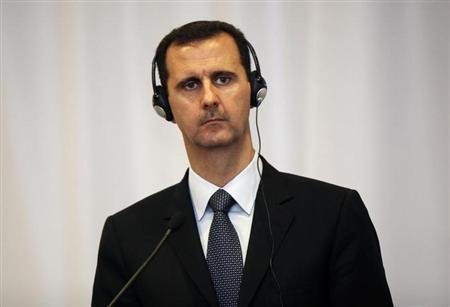
Syrian state media dismissed as "not accurate" a report by news agency Interfax that President Bashar al-Assad told visiting Russian parliamentarians he has no intention of giving up power and the issue is not up for discussion.
Assad was quoted as telling the visitors days ahead of an internationally sponsored peace conference on Syria that "if we wanted to give up, we would have done so at the very beginning. We are on guard for our country. This issue is not up for discussion."
Syrian state television said that the Assad quotes on Interfax "are not accurate". It also said Assad "did not conduct an interview with the agency", although Interfax had not said that it had.
The comments attributed to Assad underscore differences between participants ahead of the January 22 talks in Montreux, Switzerland, seen as the most serious global effort yet to end Syria's three-year conflict, during which Assad has enjoyed Russia's protection.
Syria's main political opposition group in exile agreed on Saturday to attend the talks, dubbed "Geneva 2", and said that three rebel groups supported the move.
But the fractured National Coalition itself has little influence on the ground in Syria and other major opposition fighter units have rejected its authority and peace talks.
The United Nations hopes the talks will bring about a political transition in the country, and U.S. Secretary of State John Kerry said last week that Syria's future had no place for Assad.
Syria, however, said in a letter to U.N. Secretary-General Ban Ki-moon last week that its focus at the peace conference would be on fighting "terrorism".
Alexander Yushchenko, parliamentarian and member of the delegation to Syria, was quoted in Itar-Tass, another Russian news agency, as saying Assad "suggested that his opponents announce their candidacy and run against him for the votes of the people… but so far however, no one has done it."
Syria's civil war, which started when the opposition armed itself following months of security forces shooting at pro-democracy protests, has devastated the country and caused millions to flee their homes.
Hundreds of thousands are trapped in besieged areas and polio has broken out in the country as vaccination rates plummet. The war has left more than 100,000 dead.
In the besieged Damascus Yarmouk district, where 15 people have died of malnutrition, 200 parcels of food aid were delivered on Saturday, said Chris Gunness, spokesman for the U.N. Relief and Works Agency (UNRWA).
The delivery is tiny compared to the needs of the roughly 18,000 trapped residents and Gunness said it would only feed about 333 people for a month.




